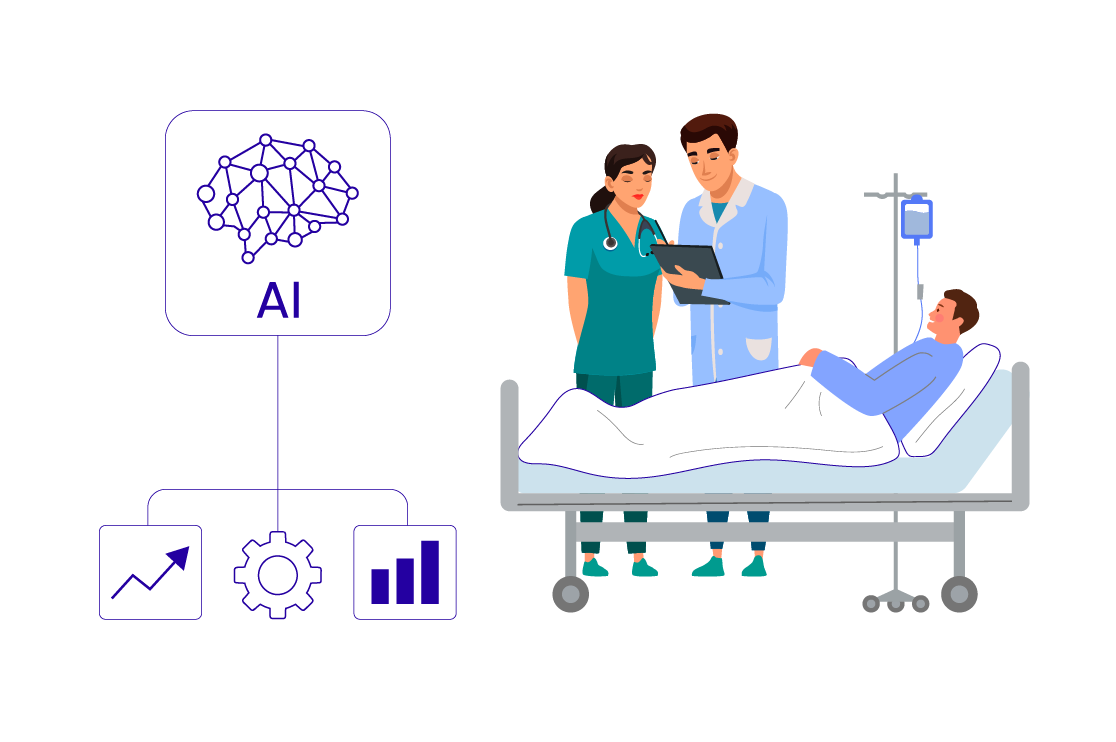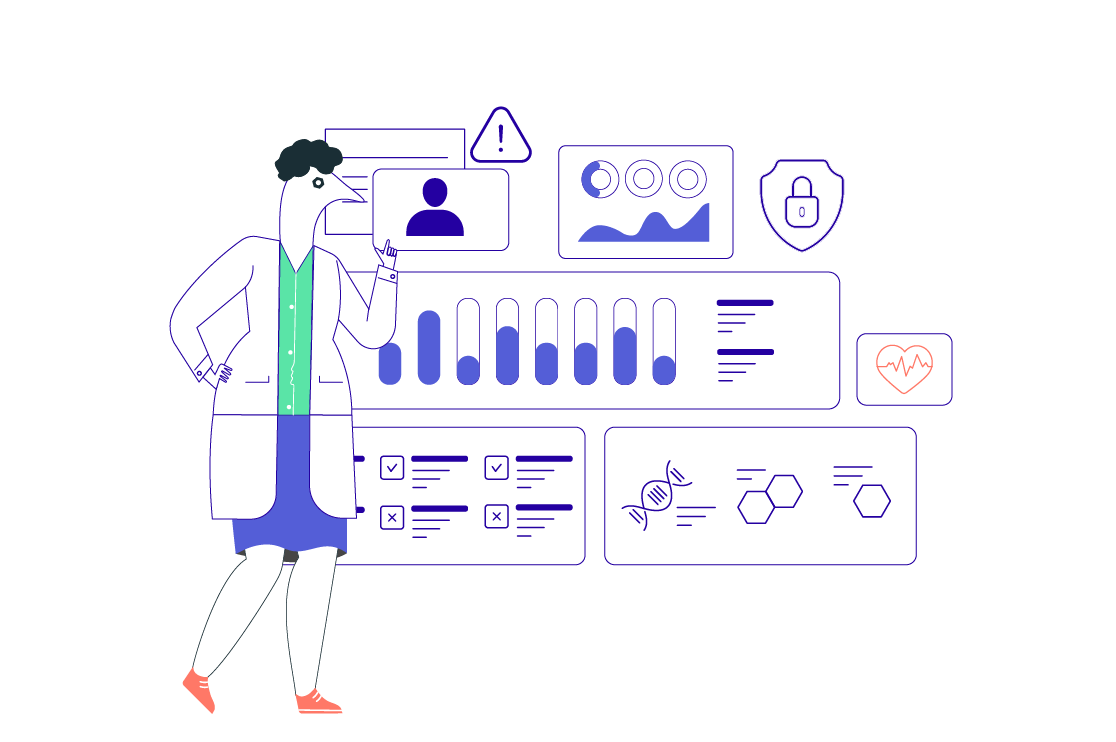As a healthcare administration head, have YOU ever wondered how you can decrease the administration overhead and operational efficiencies without having to comprise patient care? Or what strategies are you planning to incorporate for streamlining billing, claims management, and coding errors which have or might cost you millions of dollars?
Administrative cost crisis – the term used in healthcare when any escalating financial and operation processes of the administration creates a significant burden on the organization leading to strain on resources, inflation of costs, and negative impact on service quality.
For every healthcare CXO, it is vital to understand that this “term” is a crisis in disguise, bringing in challenges that disrupt the expenses incurred in catering the best patient care possible. Also, it hampers management of supply chain in healthcare, making all the processes inefficient.
Table of Contents
- Introduction: The Administrative Cost Crisis Impacting Healthcare CXOs
- Automating Claims Processing & Fraud Detection with AI
- Optimizing Patient Flow & Hospital Resource Allocation
- Revolutionizing Revenue Cycle Management (RCM) via AI
- Cutting Administrative Overhead Through Intelligent Automation
- AI-Driven Risk Management & Compliance in Sensitive Health Data
- Conclusion
- FAQs
To know this crisis a bit better, let’s learn about its major aspects in a bit detailed manner.
-
Quality care downgrade: Intricacies encountered in administration lead to disruption of patient care services on a major scale, resulting in errors and decrease in quality of the services for both providers and patients.
-
Supply chain disruption: This crisis leads to poor inventory management, inconsistencies in data, issuance of expensive materials, and other challenges adding burden over the administration.
-
Operational inefficiencies: Complex paperwork, repeated billing, and improper claims result in wastage of resources that could have been used in enhancing the overall patient care.
-
Financial strain: The inefficiency in the administration leads to huge expenses wherein the US healthcare system experienced around trillions of dollars in terms of the administrative costs.
Apart from these aspects, there’s also the challenge in the adoption of technology. Healthcare organizations need to strategically consider, invest, and implement AI powered IT systems to achieve cost efficiency & effectiveness, along with catering quality patient care.
The only way out is to strategically incorporate technology to enhance overall operational efficiency and decrease wastage of resources.
Automating Claims Processing & Fraud Detection with AI
With AI in healthcare administration, healthcare CXOs can easily take advantage of them to deal with healthcare fraud and claims processing.
These models incorporate predictive analysis, machine learning, and Natural Language Processing (NPL for short) for simplifying and insurance claims, boosting accuracy, and highlighting any fraudulent activities. All these are achieved through real-time data analysis and pattern recognition frameworks.
Claims Processing
AI tools for healthcare collect relevant data from different data sources to decrease any chance of encountering errors due to manual entry.
Since the AI systems can prioritize claims, they can easily steer them to the relevant department or even trigger automated settlements for scenarios wherein the claims are straightforward.
AI chatbots can easily handle interaction with customers for claims while offering prompt and relevant responses to their specific or frequently asked questions.
Even with authentic and relevant data, AI models for healthcare can provide automated analytics & insights, making it easier for insurers to execute data-driven decision making for faster and genuine claim assessments.
Fraud Detection
AI models incorporate advanced algorithms that evaluate large datasets for recognizing any unusual pattern/anomaly as well as suspicious behaviors.
The AI systems are constantly monitoring all transactions and policy data, offering instant alerts for any sort of potentially fraudulent activity.
Also, the AI in healthcare administration can predict any chance of fraudulent activities based on historical data and highlight higher risk claims.
AI also incorporates the data from all external databases and policy-related information for cross-verifying and authenticating the claims to prevent any discrepancies.
Optimizing Patient Flow & Hospital Resource Allocation
Optimizing patient flow and hospital resource allocation involves implementing strategies and technologies to streamline the patient journey through the healthcare system, reducing bottlenecks, minimizing waiting times, and improving operational efficiency and patient satisfaction.

This is achieved by using AI, machine learning, and predictive analytics to forecast patient demand and optimize the dynamic scheduling of staff, beds, and other resources in real-time.
Key Benefits
-
Reduced Wait Times: Streamlined processes and better resource management lead to shorter waits for consultations, tests, and treatments.
-
Improved Patient Outcomes: Timely and coordinated care improves clinical results and enhances the overall patient experience.
-
Enhanced Operational Efficiency: Better resource utilization and process optimization lead to increased efficiency and reduced operational costs.
Healthcare CXOs should consider the key elements include a collaborative, interdisciplinary approach, clear communication, and integrated systems to ensure timely treatment and efficient resource utilization.
Revolutionizing Revenue Cycle Management (RCM) via AI in healthcare administration
AI is revolutionizing healthcare Revenue Cycle Management by automating tedious tasks, increasing accuracy in billing and coding, and providing powerful predictive analytics to forecast denials and improve revenue forecasts.
By streamlining workflows, reducing errors, and enhancing efficiency, AI empowers healthcare organizations to maximize revenue, reduce costs, ensure compliance, and allow staff to focus more on direct patient care. Key applications include automated coding, intelligent denial management, improved patient financial engagement, and enhanced security features.
Keyways in which AI in healthcare administration is Transforming RCM
-
Automated Processes: AI automates repetitive and time-consuming tasks like data entry, claims processing, and payment reconciliation, which significantly reduces manual effort and minimizes errors.
-
Enhanced Accuracy: AI can analyze vast amounts of data to identify the correct medical codes and detect errors before claims are submitted, leading to fewer claim denials and increased revenue capture.
-
Streamlined Patient Experience: AI can provide accurate patient out-of-pocket cost estimations and power personalized payment plans, improving patient satisfaction and collections.
-
Improved Compliance and Security: AI tools can monitor activities for potential fraud, ensure adherence to constantly changing regulations, and help keep patient data secure.
Recommended Reading:
- Data Integration In Healthcare: Upgrading Medical Response and Delivery
- How Does Predictive Analytics in Healthcare Revolutionize Patient Care?
- AI in Customer Support: How It Is Reshaping Customer Experience in 2025
- AI App Development with Snowflake: Understanding the Enterprise Shift to AI-Powered Applications
- Leverage Generative AI for Businesses: How CXOs Can Implement Snowflake, Gen AI, & No-Code Agents
Cutting Administrative Overhead Through Intelligent Automation
AI tools automate repetitive administrative processes such as appointment scheduling, patient reminders, and managing electronic health records, freeing up human staff for more complex duties.
Beyond cost savings, AI in healthcare administration automates communication, scheduling, and access to information can lead to higher patient satisfaction and better adherence to care plans. Also, by handling administrative workloads, AI allows healthcare professionals to spend more time on patient care, a critical factor in reducing burnout.
And AI helps ensure that resources are available where and when they are needed most, leading to more efficient hospital operations.
AI-Driven Risk Management & Compliance in Sensitive Health Data
AI plays a dual and interconnected role in US healthcare by automating administrative processes while simultaneously strengthening the management of risks and ensuring compliance around sensitive health data.
In both areas, AI promises greater efficiency, accuracy, and cost savings but also introduces new challenges related to bias, data privacy & security, and data governance. AI applications are alleviating the administrative burden that contributes significantly to healthcare costs and burnout among staff.

Workflow automation: AI automates routine tasks like appointment scheduling, patient intake, and claims processing. This frees up staff to focus on more complex, patient-centered activities.
Documentation and coding: Tools using Natural Language Processing (NLP) automatically transcribe clinical notes and populate electronic health records (EHRs) in real-time, which reduces manual data entry and improves documentation accuracy.
Predictive analytics: AI analyzes historical data to forecast staffing needs, optimize nurse scheduling, and manage patient flow. This helps administrators manage resources and reduce costs more effectively.
Revenue cycle management: AI improves billing accuracy, identifies potential coding errors, and flags potential denials before claims are submitted, all of which increases revenue capture and reduces rework.
The use of AI in healthcare administration introduces new privacy and security challenges, but AI is also the most effective tool for mitigating these very risks.
Conclusion
AI is no longer just a theoretical advantage, but it’s a strategic imperative for healthcare administrators. From claims processing and fraud detection to patient flow optimization, RCM enhancement, and risk compliance, intelligent automation is reshaping operational efficiencies.
Real-world examples such as Omega Healthcare’s 30% ROI and administrative cost savings of 15,000 hours per month speak to measurable impact. Yet, responsible AI means combining technology with human oversight, ensuring fairness, accuracy, and compliance.
To navigate rising costs and staffing pressure, healthcare CXOs should prioritize AI high-impact areas like claims, RCM, and scheduling. Then, start with scalable pilots to showcase ROI. And finally, embed robust compliance and human review to ensure trust and safety.
For CXOs, merging digital ambition with pragmatic deployment will be the critical differentiator. And to experience that difference, they need to partner with reputed AI solutions development organizations like BluEnt who cater top-notch solutions for AI in healthcare administration to let you accomplish your business requirements.
Frequently Asked Questions
How is AI used in healthcare administration beyond clinical care?AI streamlines back-office operations such as claims processing, appointment scheduling, billing, resource allocation, and compliance reporting. It helps reduce administrative burdens on staff, improve efficiency, and ensures more accurate data management.
Can AI help reduce costs in healthcare administration?Yes. By automating repetitive tasks like insurance verification, coding, and documentation, AI reduces human errors and operational overhead. Predictive analytics also helps optimize staffing and resource planning, which minimizes waste and unnecessary expenses.
How does AI improve patient experience outside clinical settings?AI enhances patient engagement through virtual assistants, chatbots, and intelligent scheduling systems, which reduce waiting times and provide 24/7 support. Personalized communication (reminders, billing updates, follow-ups) also leads to a smoother, more patient-friendly administrative journey.
What role does AI play in regulatory compliance and data security?AI tools can monitor compliance with HIPAA, GDPR, and other healthcare regulations by flagging anomalies, tracking access logs, and automating audit trails. In addition, AI-driven cybersecurity solutions detect unusual network activity to protect sensitive patients and operational data.
What challenges do healthcare organizations face in adopting AI for administration?Key challenges include data silos, integration with legacy systems, staff training, upfront costs, and ethical considerations such as transparency in automated decision-making. Overcoming these requires careful change management, vendor selection, and a phased AI adoption strategy.












 AI Algorithms for Business Decisions: How They Deliver Real Value & Growth for CXOs
AI Algorithms for Business Decisions: How They Deliver Real Value & Growth for CXOs  AI in Programming: Disruption, Evolution, and CXO Strategy
AI in Programming: Disruption, Evolution, and CXO Strategy  AI for Supply Chain Resilience & Optimization: Strategies for 2026 and Beyond
AI for Supply Chain Resilience & Optimization: Strategies for 2026 and Beyond  AI in Financial Services: From Risk Management to Revenue Growth
AI in Financial Services: From Risk Management to Revenue Growth 
